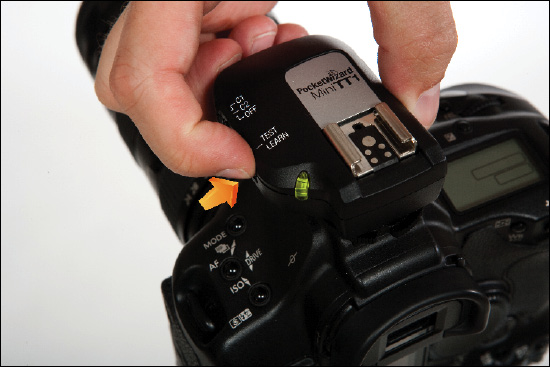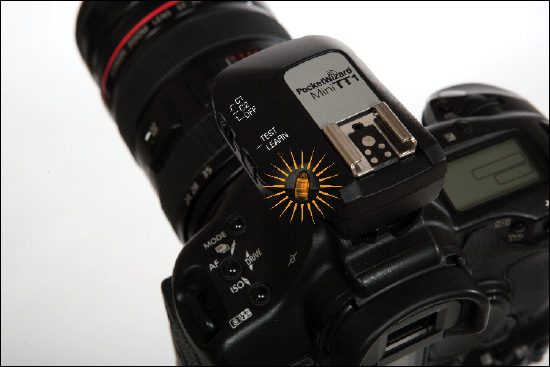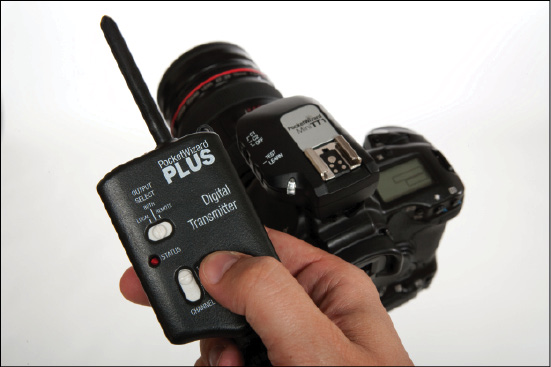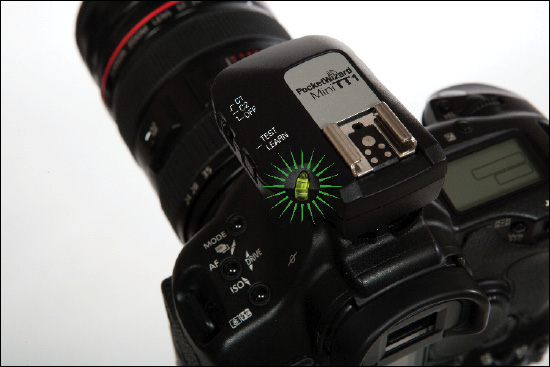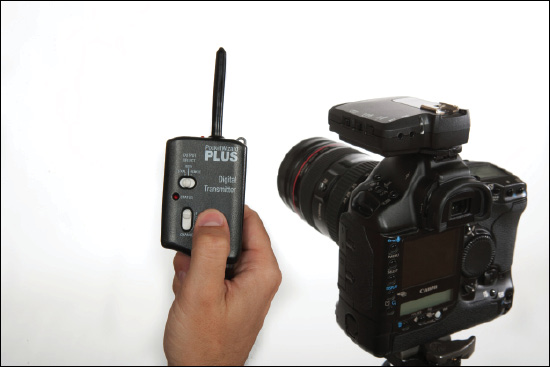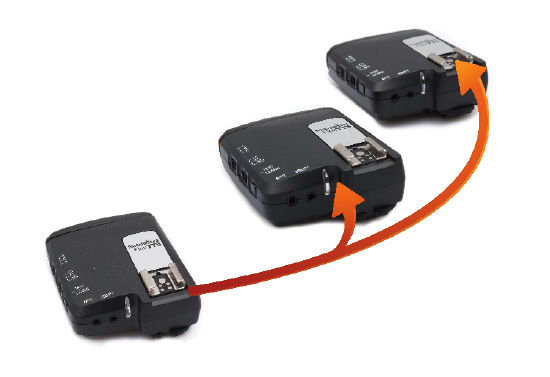Difference between revisions of "Learn Mode"
(→Engaging Learn Mode: disabled video autoplay and video suggestions) |
|||
| (One intermediate revision by one other user not shown) | |||
| Line 8: | Line 8: | ||
It is '''highly recommended''' that you use your computer to set your channels whenever possible, but this handy mode is provided for special situations. | It is '''highly recommended''' that you use your computer to set your channels whenever possible, but this handy mode is provided for special situations. | ||
| − | |||
| − | |||
| − | |||
| − | |||
{| | {| | ||
| | | | ||
|} | |} | ||
| − | |||
| − | |||
== Important == | == Important == | ||
Latest revision as of 12:46, 8 July 2015
| Next recommended reading: Mounting |
Learn Mode allows you to change channels in a ControlTL radio when you are away from your computer by using any PocketWizard transmitter to teach a new channel. This allows you to change to a different channel or frequency when shooting at an event and you don't have access to the PocketWizard Utility.
It is highly recommended that you use your computer to set your channels whenever possible, but this handy mode is provided for special situations.
Contents
Important
IMPORTANT: Learn Mode is not required for normal operation of your radios. It is intended as a tool for resolving channel conflicts in the field. Most photographers can use the default channels safely. If you wish to operate on different channels, then the PocketWizard Utility is the recommended method for setting channels.
See the PocketWizard Utility section for more information on setting channels from within the Utility. See the Channels section for more information on channels and frequencies.
Standard or ControlTL?
When Learn Mode is engaged on a ControlTL radio, that radio will listen to all the frequencies and channels that it can. As soon as it hears a trigger from another PocketWizard transmitter, it learns a channel.
A ControlTL transmitter like the FlexTT5 or MiniTT1 transmits on two channels with each trigger: ControlTL and Standard. You need to make sure the radio you are teaching learns the proper one. You need it to learn a ControlTL if you are using Canon or Nikon Speedlights in TTL mode.
To teach ControlTL radios to use Standard channels, use a Standard transmitter like a Plus II or MultiMAX as the teaching radio for all learning radios including the MiniTT1 or FlexTT5 to be used as the primary transmitter.
To teach ControlTL radios to use a ControlTL channel, teach the ControlTL transmitter you will be using first, then use it to to teach all the radios you want to receive on ControlTL channels. If all you have to teach with is a Standard radio like a Plus II or MultiMAX, you can use it to teach a different ControlTL channel. See the table below for corresponding channels.
If you are using a ControlTL transmitter like the MiniTT1 or FlexTT5 on your camera, and you want to have your flash respond to power settings from the AC3 or perform PowerTracking, make sure your radios learn a ControlTL channel. Standard Channels on the Plus II and MultiMAX can be used for triggering only.
Transmitting channel
A MiniTT1 or FlexTT5 learning from another PocketWizard transmitter will learn both a Standard channel as well as a corresponding ControlTL channel for transmitting. See below for more information about corresponding channels.
Receiving channel
A FlexTT5 Transceiver can only receive on one channel at a time. It receives on *either* a ControlTL *or* a Standard channel, not both simultaneously. When being taught from a Standard transmitter it will learn to receive only on a Standard channel. When being taught from a ControlTL transmitter, it is designed to learn the ControlTL channel, but you need to verify that using the information below.
Engaging Learn Mode
Follow the steps below to put your PowerST4 in Learn Mode.
IMPORTANT: Hold radios at least 2 feet apart when teaching/learning. Your flash may trigger during teach/learn.
- Prepare your ControlTL radio for Learn Mode:
- MiniTT1 and FlexTT5 - turn the radio on and select the configuration to be taught, C.1 or C.2. Wait 3 or 4 seconds until you see the normal green blinks indicating the radio is ready to go with good batteries. Learning takes a lot of power for the MiniTT1 so be sure you are starting with a good coin cell battery.
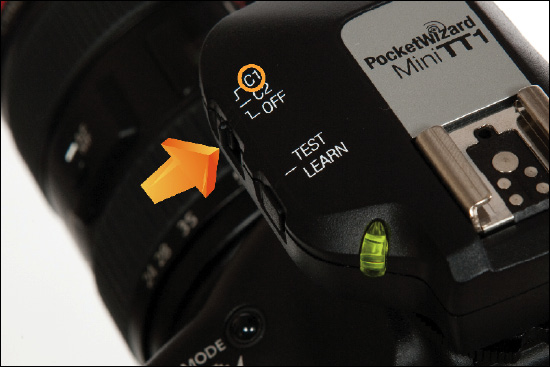
- PowerST4 - Plug the PowerST4 radio into a compatible flash and turn it ON.
- Press and hold TEST on the radio to be taught for several seconds. The led will pulse red becuase you are transmitting!
- When the Status LED blinks amber 4 times, Learn Mode is engaged (amber pulsing)! Quickly release TEST and ...
- Immediately press and hold TEST on the teaching transmitting radio (MiniTT1, FlexTT5, MultiMAX or Plus II).
- When the Status LED blinks green, the channel is learned:
- 1 green blink = Low Standard channel learned (1 through 16, including Plus 1 through 4)
- 2 green blinks = High Standard channel learned (MultiMAX 17 through 32)
- 3 green blinks = ControlTL channel learned for MiniTT1 or FlexTT5
- If you see no green blinks during the LEARN cycle then the radio did not learn a new channel and will use the previous one. Hold the radios farther apart and try teaching again.
For remote E-TTL II to function, the ControlTL channel must be learned. If you see only 1 or 2 green blinks after teaching then a Standard channel was learned and E-TTL II will not function. If you desire E-TTL II functionality, teach the FlexTT5 again from the MiniTT1 or FlexTT5 to be used as the primary transmitter and look for 3 green blinks.
Programming FlexTT5 units for ControlTL operation when teaching with a Standard PocketWizard
If you are using a FlexTT5 as a transmitter in your system, and you want it to learn a different ControlTL channel from a Standard transmitter, you need to follow this sequence to make sure all of your FlexTT5 radios transmit and receive on the same channel.
- Teach a transmitting FlexTT5 with a standard PocketWizard.
- Use the programmed FlexTT5 transmitter to teach all other FlexTT5 receivers. Make sure you see 3 green blinks which confirms the ControlTL channel was learned. If you see only 1 or 2 blinks after teaching, then the FlexTT5 is listening on a Standard channel and will not receive TTL or {{PowerTracking]] information. Teach it again if you need TTL or PowerTracking.
- Reprogram the FlexTT5 transmitter (the first one you taught) with one of the FlexTT5 receivers. This assures all FlexTT5 radios will send and receive on the same ControlTL channel.
Special Notes
- On a transmitting radio like a MiniTT1 or FlexTT5, when you are holding TEST to engage Learn Mode, you are also transmitting! Make sure remote equipment that you do not want to trigger is turned off.
- Activating LEARN in a MiniTT1 causes a large drain on the coin cell battery. To maintain the best battery life, use the PocketWizard Utility to teach channels to the MiniTT1 whenever possible.
- For a MiniTT1 or FlexTT5 only the configuration set, C.1 or C.2, will be taught. The other configuration will retain its settings.
- For a MiniTT1 or FlexTT5 all other settings as set in the PocketWizard Utility will remain in effect. If you wish to reset your radio to Factory Defaults, follow that procedure, then engage Learn Mode.
- Learn Mode is only used by ControlTL radios like the MiniTT1, FlexTT5 or PowerST4. Standard radios like the Plus II and MultiMAX do not learn channels, but can be used to teach ControlTL radios different channels.
- Radios from different world regions cannot be used together with Learn Mode. CE radios cannot teach or learn US FCC/IC channels and frequencies, and vice versa. See the Channels section for more information on channels and frequencies.
- A Sekonic Meter cannot be used to teach. Its brief trigger mode is not compatible with LEARN.
- Custom IDs from MultiMAX radios are not learned.
- When teaching a ControlTL transmitter from another ControlTL transmitter, usually only the ControlTL channel is learned and not the Standard Channel. Even though your teaching radio is transmitting on two channels, Standard and ControlTL, the learning radio only hears the one it received first which is usually the ControlTL channel. The Standard channel that the radio being taught will use is based on the table below.
Corresponding Channels Table
When you teach a ControlTL transmitter, like a MiniTT1, from a Standard transmitter, like a Plus II, the ControlTL transmitter learns to transmit on the Standard channel you taught it with and uses a corresponding ControlTL channel from the table below.
| If you taught it this Standard Channel |
It will also transmit on this ControlTL Channel |
|---|---|
| 1 | 1 |
| 2 | 2 |
| 3 | 3 |
| 4 | 4 |
| 5 | 1 |
| 6 | 2 |
| 7 | 3 |
| 8 | 4 |
| 9 | 1 |
| 10 | 2 |
| 11 | 3 |
| 12 | 4 |
| 13 | 1 |
| 14 | 2 |
| 15 | 3 |
| 16 | 4 |
| 17 | 5 |
| 18 | 6 |
| 19 | 7 |
| 20 | 8 |
| 21 | 9 |
| 22 | 10 |
| 23 | 11 |
| 24 | 12 |
| 25 | 13 |
| 26 | 14 |
| 27 | 15 |
| 28 | 16 |
| 29 | 17 |
| 30 | 18 |
| 31 | 19 |
| 32 | 20 |
This is also true if you are teaching one ControlTL transmitter with another - the ControlTL channel will be learned and the Standard channel will be based on the table below.
| If you taught it this ControlTL Channel |
It will also transmit on this Standard Channel |
|---|---|
| 1 | 1 |
| 2 | 2 |
| 3 | 3 |
| 4 | 4 |
| 5 | 17 |
| 6 | 18 |
| 7 | 19 |
| 8 | 20 |
| 9 | 21 |
| 10 | 22 |
| 11 | 23 |
| 12 | 24 |
| 13 | 25 |
| 14 | 26 |
| 15 | 27 |
| 16 | 28 |
| 17 | 29 |
| 18 | 30 |
| 19 | 31 |
| 20 | 32 |
You will notice in this table that it is not possible to teach Standard channels 5-16 from a ControlTL transmitter.

